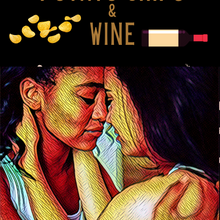Pt. 1: Afrofuturism as a Regenerative Future: Beyond The 'Cruelty-Free' Plantation Model of FoodTech
- Breeze Harper

- Oct 27, 2022
- 3 min read
Updated: Oct 28, 2022

My name is Dr. A. Breeze Harper. I am the founder of theThe Sistah Vegan Project. I live in the USA. I was born and raised here. Literally, this is the site of genocide of millions of #indigenous people & their land stolen. #Africans were enslaved to build the agricultural system which directly created the wealth of white landowning men (and women). This was the birth of USA's food system, economics, & racial caste system. As a Black woman, activist, and academic scholar, I have 'learned' that I'm not supposed to point out that every time I go to a USA based food tech event about #veganism and #alternativeproteins it's almost always #white; or, framed through 'objective' & 'post-racial' lenses that still uphold and benefit the logics of #colonialism, #plantation, #supremacy, and racial/light skin #privilege (which is contingent upon anti-Blackness & anti-Indigeneity). My perspective is rarely welcomed, despite it being critical and informed by rigorous research, my professional experience as a DEI consultant and trainer within the ethical consumption sector for 15+ years, and my PhD focus from 2007-2013 at UC Davis. Currently, U.S.A. framework for the future of foodtech echoes the USA's violent nation-building project from back in the day: mostly white people at the helm who have strategically decided to collectively ignore the need for racial equity and justice within the food system that challenges the current [neoliberal] [white] capitalist-patriarchal model sold as 'the universal solution'. One cannot 'fix' the food system by only funding, supporting, and giving resources to those at the top of the racial caste system in the USA. You can't build an equitable food system of the future with plantation logic under the guise of 'green' or 'cruelty free', simply because a non-human animal was not harmed. 4 years ago I was invited to give a keynote talk at a major event focused on funding within veganism and animal rights in the USA. The organizers had never considered focusing on 'diversity, equity, and inclusion', hence, the organizers asked me to give a keynote address about this subject. There were 200 people in attendance. I was one of 3 nonwhite people in that space. The participants collectively embodied powerful and well-resourced white people within the world of investing, funding, and non-profit leadership 'for animal advocacy' or 'veganism'. The hotel staff serving food there were mostly Brown and Black people. I even indicated that this was ridiculous that the people making decisions about the future are all white while being served by Brown and Black food workers; this was a plantation model. Also, my keynote talk made me feel like I was just a check box. Why? Well, fast forward 4 years later & most organizations that were there at that event in 2018 are still talking about ,"How we need more diversity. Why isn't the space diverse enough?". The question rings hollow and is dangerously performative. There has been no deep action at the structural level to engage in equity, justice, and liberation for Black, Brown, and indigenous people. How can so many people on the top tier of this USA racial caste system talk passionately about ending animal suffering while literally being annoyed about, or silencing the cruelty of their covert/overt investment in whiteness/anti-Blackness/anti-indigeneity in this extractive capitalist caste system? Was this the plan all along? To have an animal free food system of the future....while leaving a racial #capitalist caste system in place?
This Spring 2023 conference will explore alternatives to this 'cruelty-free' plantation food-tech model, invoking the power of Afrofuturism to reimagine a future without supremacy and colonial logic.
What is Afrofuturism?
"Afrofuturism was born in the minds of thousands of enslaved Africans passing the horrific Middle Passage while saying prayers for their lives and that of their descendants. These people dreamt of a society completely without both physical and social bondage of oppression. These were the first Afrofuturists, and they brought to life what we know as the definition today. Afrofuturism is all about evaluating the past, present and future and imagining a world that encourages better conditions for Black people through literature, music, technology, and arts. In Afrofuturism, the world has a structure that doesn’t violently oppress Black communities. Afrofuturism gives us a platform to thrive in our own culture, where we imagine ourselves achieving greatness without external influence. This was a tool used several years ago and is still valuable today…imagining a better future in the contemporary era. Afrofuturism also serves as a symbol of hope."
Source-Blerd
As we build our conference agenda and list of presenters, artists, and sponsors, we ask that you subscribe so we can send you updates about this event. You can also email me directly at sistahvegan@gmail.com .









































Comments